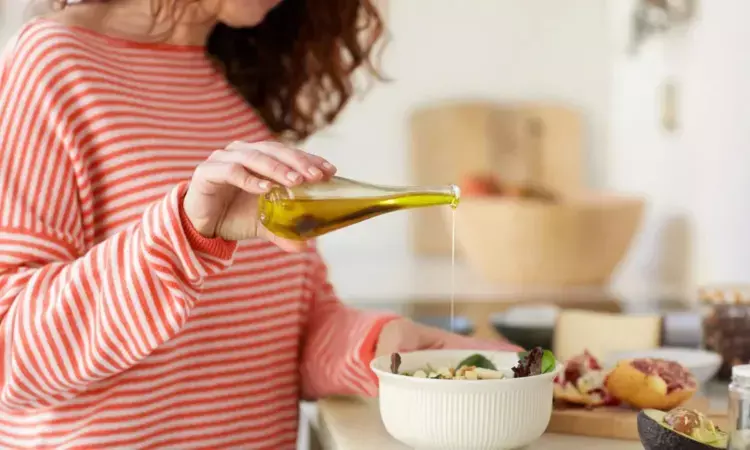- Home
- Medical news & Guidelines
- Anesthesiology
- Cardiology and CTVS
- Critical Care
- Dentistry
- Dermatology
- Diabetes and Endocrinology
- ENT
- Gastroenterology
- Medicine
- Nephrology
- Neurology
- Obstretics-Gynaecology
- Oncology
- Ophthalmology
- Orthopaedics
- Pediatrics-Neonatology
- Psychiatry
- Pulmonology
- Radiology
- Surgery
- Urology
- Laboratory Medicine
- Diet
- Nursing
- Paramedical
- Physiotherapy
- Health news
- Fact Check
- Bone Health Fact Check
- Brain Health Fact Check
- Cancer Related Fact Check
- Child Care Fact Check
- Dental and oral health fact check
- Diabetes and metabolic health fact check
- Diet and Nutrition Fact Check
- Eye and ENT Care Fact Check
- Fitness fact check
- Gut health fact check
- Heart health fact check
- Kidney health fact check
- Medical education fact check
- Men's health fact check
- Respiratory fact check
- Skin and hair care fact check
- Vaccine and Immunization fact check
- Women's health fact check
- AYUSH
- State News
- Andaman and Nicobar Islands
- Andhra Pradesh
- Arunachal Pradesh
- Assam
- Bihar
- Chandigarh
- Chattisgarh
- Dadra and Nagar Haveli
- Daman and Diu
- Delhi
- Goa
- Gujarat
- Haryana
- Himachal Pradesh
- Jammu & Kashmir
- Jharkhand
- Karnataka
- Kerala
- Ladakh
- Lakshadweep
- Madhya Pradesh
- Maharashtra
- Manipur
- Meghalaya
- Mizoram
- Nagaland
- Odisha
- Puducherry
- Punjab
- Rajasthan
- Sikkim
- Tamil Nadu
- Telangana
- Tripura
- Uttar Pradesh
- Uttrakhand
- West Bengal
- Medical Education
- Industry
Both Low Extra-Virgin Olive Oil and Plant-Based Diet Reduce LDL More Effectively: Recipe for Heart Health

USA: A recent randomized crossover trial (Recipe for Heart Health trial) has provided new insights into how extra virgin olive oil (EVOO) affects cardiometabolic health when included in a whole-food plant-based vegan diet.
The study published in the Journal of the American Heart Association suggests reducing extra-virgin olive oil intake within a whole-food, plant-based diet may help lower LDL cholesterol levels in individuals at risk for atherosclerotic cardiovascular disease (CVD).
Whole-food, plant-based vegan diets that are low in oils, and Mediterranean diets rich in EVOO are known to lower cardiovascular disease risk factors. However, the ideal amount of dietary fat, especially EVOO, remains uncertain. Andrea M. Krenek, Food Science and Human Nutrition Department University of Florida Gainesville FL, USA, and colleagues aimed to compare the effects of consuming a high versus low amount of EVOO within a whole‐food plant‐based diet (WFPBD) vegan diet pattern on LDL‐C and other cardiometabolic markers in the Recipe for Heart Health (RFHH) trial. They hypothesized that the WFPBD would reduce LDL-C levels and that LDL-C would decrease more significantly from baseline during the low EVOO phase of the WFPBD.
For this purpose, the researchers conducted a randomized crossover trial with weekly cooking classes, adults with a cardiovascular disease risk of 5% or higher followed a whole-food, plant-based diet with extra virgin olive oil (EVOO) for four weeks each, switching between high (4 tablespoons/day) and low (<1 teaspoon/day) EVOO levels. The trial included a 1-week washout period between the two diet phases.
The primary outcome was the difference in LDL-C from baseline. Secondary outcomes included changes in other cardiometabolic markers. Linear mixed models were used to evaluate changes from baseline between diet phases, adjusting for age, sex, and changes in body weight.
The study led to the following findings:
- In 40 participants, fat intake comprised 48% and 32% of energy during the high and low EVOO phases, respectively.
- Both diets resulted in comparable reductions in LDL‐C, total cholesterol, apolipoprotein B, high‐density lipoprotein cholesterol, glucose, and high‐sensitivity C‐reactive protein.
- With diet‐sequence interactions for LDL‐C, differences were detected between diets by diet order (mean high to low: Δ‐12.7mg/dL versus low to high: Δ+15.8 mg/dL).
- Low to high order led to increased glucose, total cholesterol, and high‐density lipoprotein cholesterol.
- Over period 1, LDL‐C reductions were −25.5 post‐low versus −16.7 mg/dL post‐high EVOO, which diminished over period 2.
"Both plant-based diet patterns improved cardiometabolic risk profiles compared to baseline diets, with more pronounced reductions in LDL-C observed after the low EVOO diet. However, adding EVOO following a period of low intake may limit further decreases in lipid levels," the researchers concluded.
Study limitations include potential carryover effects from diet sequences despite washout periods and a short study duration, which might have missed long-term metabolic changes. Uncontrolled macronutrient distribution affects insights into EVOO’s role in appetite and fat consumption. The impact of the COVID-19 pandemic on recruitment, recall bias in dietary assessments, and inadequate food options for capturing dietary patterns are also noted. Future research should address these issues and include more diverse samples.
Reference:
Krenek AM, Mathews A, Guo J, Courville AB, Pepine CJ, Chung ST, Aggarwal M. Recipe for Heart Health: A Randomized Crossover Trial on Cardiometabolic Effects of Extra Virgin Olive Oil Within a Whole-Food Plant-Based Vegan Diet. J Am Heart Assoc. 2024 Jul 24:e035034. doi: 10.1161/JAHA.124.035034. Epub ahead of print. PMID: 39045758.
Dr Kamal Kant Kohli-MBBS, DTCD- a chest specialist with more than 30 years of practice and a flair for writing clinical articles, Dr Kamal Kant Kohli joined Medical Dialogues as a Chief Editor of Medical News. Besides writing articles, as an editor, he proofreads and verifies all the medical content published on Medical Dialogues including those coming from journals, studies,medical conferences,guidelines etc. Email: drkohli@medicaldialogues.in. Contact no. 011-43720751


